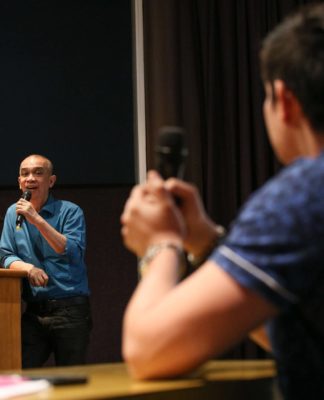BUSINESSMEN and government officials must work to boost the weak manufacturing sector to help reduce poverty.
The Philippine Institute for Development Studies (PIDS), a non-profit government research institution, called on top executives, economists, and policy makers to develop the manufacturing sector by empowering the academe to achieve quality education, during the celebration of the 10th Development Policy Research Month (DPRM) at the National Economic Development Authority Building in Makati last Sept. 24 to 26.
“If you have had developed manufacturing sector, there would have been more high-paying jobs for the less-educated people,” PIDS president Josef Yap told the Varsitarian. “And that means that poverty incidence would have been lower.”
With this year’s theme “Regional Economic Integration and Inclusive Growth: Engaging Nations, Embracing People,” the forum also tackled the effects of regional economic integration and globalization through better trade and investment in the Philippines.
Yap said the structure of the manufacturing sector, which is commonly associated with engineering and design as well as production of garments, automobiles, chemicals, and furniture, employs more less-educated people compared with the services sector, which employs people in retail businesses, hotels, education services, and recreation.
“The share of the manufacturing sector in the economy is not as large as other neighboring countries like Thailand, Malaysia, and Indonesia,” he said. “[Data showed] that in the past 10 years, service sectors employ more college graduates than the manufacturing sector.”
Borderless cooperation
The upcoming economic summit of countries in the Southeast Asian region in 2015 prompted PIDS to come up with this year’s focus on the manufacturing sector.
Ten members of the Association of South East Asian Nations (Asean) are expected to form a “customs union” that will be dubbed as the Asean Economic Community (AEC).
“It will be borderless in terms of trade flow and investment flow,” Yap said. “[At present], all the countries have been implementing measures to be consistent with the vision of AEC.”
He said less-educated people tend to have higher poverty incidence and a dynamic manufacturing sector could provide more high-paying jobs for them.
Improving the quality of education is another way to achieve economic sustainability in the economy.
“If you are able to give people more education, that can help them overcome poverty,” he said.
PIDS hosted a two-day seminar to link the limited development of the manufacturing sector with poverty incidence, which was said to be higher in the Philippines.
In line with the 10th DPRM celebration, PIDS also hosted a research fair that ran for three days.
Among the 21 research institutions that participated in the research fair was the University’s Research Cluster for Culture, Education, and Social Issues (RCCESI).
Other research institutions were from the University of the Philippines, University of Asia and the Pacific, Ateneo de Manila University, De La Salle University–Angelo King Institute in Dasmariñas, Cavite, Asian Development Bank Office of Regional Economic Integration, AIM Policy Center, Bangko Sentral ng Pilipinas, Department of Foreign Affairs-Office of Undersecretary for International Economic Relations, Institute for Labor Studies, IBON Foundation, National Anti-Poverty Commission, National Economic and Development Authority, National Statistical Coordination Board, Philippine Academic Consortium for Latin American Studies, and Social Weather Stations.
PIDS is the lead agency that recommends to the public “evidence-based” policies, or policy that is based on evidence and data, which ensures more relevant and effective guiding principles in law making. Cez Mariela Teresa G. Verzosa















